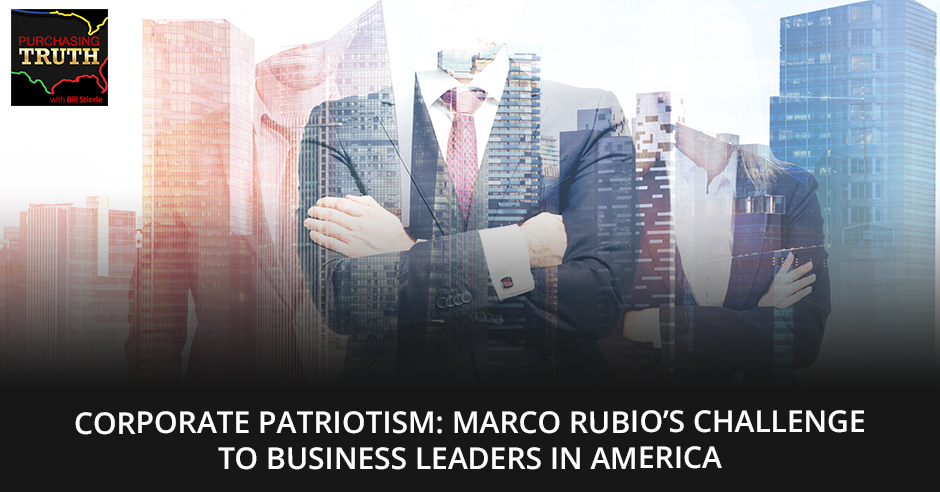Corporate Patriotism: Marco Rubio’s Challenge to Business Leaders in America
Subscribe Today!

Is corporate America becoming less patriotic by identifying as a “citizen of the world”? In today’s episode, Bill Stierle and Tom share their thoughts on Florida Senator Marco Rubio’s “inflammatory” piece for The American Conservative discussing a Marxist revolution in corporate America. The op-ed contains claims against this shift which paints all corporate leaders as anti-American. The two ponder on the intent and implications of Rubio’s statements and share their take on the new generation's perspective on politics. Tune in as they dissect the piece and expound with their own take on the matter.
---
Watch the Episode Here
Corporate Patriotism: Marco Rubio’s Challenge to Business Leaders in America
Bill, my jaw is still dropping after reading an interesting piece of communication published in a conservative publication, The American Conservative by Marco Rubio, the Republican Senator from Florida. I need to quote a couple of things he said, but I'm interested in talking with you about this as a communication piece.
How do you read something, and even though it's activating you as a reader, how do you have some compassion or opinion for the writer and get some understanding about what the motive is, but also to see who does it serve? That's important, too, Tom. It seems like he said some stuff that was a little inflammatory, at least.
I'm going to read a couple of quotes here. First, he called Corporate America the instrument of anti-American ideologies. He accused Wall Street of devoting hundreds of billions of dollars to advance corporate propaganda that promotes Marxist tactics. He wants to require that the leadership of large companies be subject to strict scrutiny and legal liability when they abuse their corporate privilege by pushing wasteful anti-American nonsense. Interesting choice of words there.
Let me follow up with one more shocking quote. He warned readers of the current Marxist Cultural Revolution among our corporate elite said that the ultimate way to stop them is to replace them with a new generation of business leaders who consider themselves Americans, not citizens of the world. He is trying to separate being American from being a world citizen. I don't know if Corporate America is going to take to that too well. We have a global economy more and more, and so many American companies are doing business overseas. My jaw kept dropping as I read this. He's going for the America first message again.
If I'm being empathetic and compassionate to him, he feels worried and anxious about certain values being spoken by corporate leaders. They are leaders and we've had many corporate leaders have opinions about their views about the way their values run. Past America was a big tent like that. It would allow conservative leaders to speak in a conservative way and liberal leaders lead in a liberal way. Their companies would have customers who would participate in purchasing products from conservative companies as well as liberal companies.
Some leaders are more vocal about that. Some leaders are not as vocal about that. They'll pick their messaging and their PR is right down the middle. They say, “That's about this. We believe this.” Stuff like that in there. In this case, for a politician to write a piece that says, “Here's what loyalty looks like. Loyalty looks like having a factory in America.” “It does? Does loyalty also look like being legally required to make as much money for this shareholder as possible?”
That means I need to put my factory in another place because I can't make as much money as possible for my shareholder unless I put my factory in another place. Tell me how you want it both ways because the shareholder is the one that I'm working for here. I’m paying you like the politicians to keep my regulations low and my taxes low. I'm also making sure I'm working the numbers for my shareholders.
It's hard for the truth to be spoken through an article. It's more of an inflammatory piece. It's something that I'm going to get the limbic brain of my voter to get mad about. I'm voting for Marco Rubio because he is a pro-American first and that slogan is something my former president ran and won on. I'm going to see if I can take a run out of that. If I judge and criticize a business leader about that, then I'm going to create the loyalty or investment inside that. Does that make some sense that he's trying to amplify loyalty towards America but only giving a slice of the truth?
What was shocking to me is that he casts American business and leaders as all being dressed in the same suit. He classifies them as one. That's quite a leap in my mind. I know there's a Republican political reaction to Corporate America saying, “They're not going to donate to Republican candidates who participated in any way in the January 6th, 2021 insurrection.” This probably is somewhat of a reaction to that.
That's a part of it too. The hardest part about this is accountability. Where does integrity land? There are two places where integrity has got to land. It's going to land either on, we're going to have integrity with the law and we're going to prosecute people who break the law or we're going to prosecute people in the world of public opinion and we're going to send them packing. That person cannot work anymore and they're stuck wherever they are in their career or until they retire or they're living their life in isolation.
Richard Nixon got caught with both the letter of the law, we don't have enough votes for you, and the Court of Public Opinion. After he left, I don't think I heard one thing out of Richard Nixon forever after that. What happened is that the public opinion and the Court of Law both came down on the person that did something wrong. What happens if you only have one or the other do it? You can impeach the president twice, but in the Court of Public Opinion, he shouldn't have been impeached because the Russian thing was a hoax, and there wasn't an insurrection. He didn't incite violence.
It was up for the people. The people came there. We got to stay on this narrative that's a winner because these people believe the vote. I am not a vote counter. I am a trust extender. I'm extending trust to the poll workers, people in charge, vote counters, and the system. Even if there's message over message not to trust the system, but there are people that their limbic brain is going like, “There's a real danger here because the people I voted for is telling me there is a problem. I'm going to believe them because they're my leader.” If they're ambiguous or darn right saying, “I believe that there was voter fraud.” The politician isn't wrong. There is minor voting fraud. They will find a voter to. There are people that will try to vote twice.
They vote for their deceased parent or spouse. It happens on such a small scale. It's not something that can tip an election.
At this point, it's not in that space. Until people don't trust it anymore, then we've got a problem. What happens is the rumor, the situation or circumstances is like, “I don't trust the system now.” That's where it gets dangerous. Are we going to trust the system? That's the fire that is being played with right now. That's hard and we need accountable people on both sides to go like, “This is where the truth is falling on this.”
What we need is some cooperation, Bill. Let's look at Arizona for a second. The state-appointed workers, the poll workers, the secretary of state, and the people whose job is to count the votes. They did their job and counted it once. There was some concern that the count had been altered. They counted it the third time and got the same results. There's no cooperation and trust in the system. The Republicans in Arizona decided, “We want to do our own audit.”
They hired a third-party company to do an audit and eventually got the same results. Any of the variations went in Joe Biden's favor after their audit. It's interesting. There was so much moving toward, “We got to count the votes. We got to find the problem. We got to find out who really won.” It's much easier to sell that outrage and distrust than it is.

It is because if you're in a silo of public opinion and you're listening to this one message, it keeps activating the same belief, bias, and structure. What winds up happening is that the person has a buy-in and is not willing to listen to the other one, and then it becomes easy to name-call, label, diagnose, judge, and criticize a person rather than to listen and be empathetic and be compassionate to how the person has been bought and sold into this place. This is not even political. Whether it's a Democratic view, a Republican view set, a jihadist view set or a religious view set, it's hard to shake a person of their belief and their bias because they've heard it over and over again.
To be able to tolerate ambiguity is hard. Shall I do an eye for an eye or shall I do turn the other cheek? Which one shall I do? The listener is saying, “It depends.” “Depends on what?” “Are you doing an Old Testament piece or are you doing a New Testament piece? Which one are you going to pick?” A person might say, “I'm doing the Old Testament piece.”
The person needs to know that fairness looks like if you did this at this cost, our legal system leans a little that way. We will call those conservative judges. If it's turned the other cheek, then it's, “You've done this twice. It costs us more to keep you in jail than it is out. We're going to give you another chance, but you better not be here again or else 25 to life.”
You're a liberal judge. We don't do a good job of that simple binary thing I did there. It's a simple binary thing. Are you going to pick this harshly? This person did a felony. They stole a candy bar, 25 to life. Are we doing that? That's what the voters voted for. The voters are voting on their bias. They're not voting on the practicality. For God's sake, it's a candy bar, public service police, and other items rather than paying for this person and putting this person in jail that's going to cost us upward of $30,000, $40,000, and $50,000 a year to house the person over a candy bar.
Bill, doesn't it end up a lot of time, though? You made an example of potentially a liberal judge and those different decisions, but don't we often see that it doesn't even fall on those lines that it falls along whether the person accused is on your team or not? Is it your guy or a woman?
If you give Hillary Clinton a pass on this, if you give off the mistakes that she made, if you give Colin Powell a pass on the mistakes that he made, or you give Bill Clinton and George W. Bush a pass on this, it’s unsettling. It depends on who's team it is that you're giving a pass on it because, “I liked the person because they looked like us. They believe the way I did. I voted for them. I'm going to give them the pass because they're saying the same thing that the other guy did.” Marco Rubio is staying down that thread that Donald Trump has established as a “winner” for his state. He's got to do reelection. He's going to be in a tough one.
The Democrat is not going to win and call your county Naples, Florida because that's one of the richest counties in the United States and other counties are not like that. They’re voting their interests. They don't want a person in there that's a big tax person because I moved to this state because it was a low tax state to retire, sit on the beach and live in the warm weather. That’s what I did. I want to retire here and keep all my money while I do that.
It's not a judgment. Money is not a bad thing. The money to meet the need for stability for the middle-class might be something that the people of affluence may want to think about because that helps them to have a stable thing. Who wants to read about all this noise, worry about XYZ, and get scared by things we don't need to be scared about? There's a lot of great things that are happening in the world and good areas of peace.

A good example of getting a pass could be what we see presidents do a lot of the time by pardoning people. You have your Rule of Law piece, which is very conservative law and order. It could be considered. It's not universally in your example. You have somebody like Colonel Michael Flynn, who was pardoned. He lied to the FBI. He admitted it and the president pardons him. A lot of people will follow the president thinking, “He wasn't guilty of anything big.”
The reality is, “He was guilty of it. He could have been up for treason. The judge was a little light on him.” The president gave him a pardon because it was the turn the other cheek. “We're going to let the person go because he's on our team and we're not doing the Rule of Law with him.”
Who was the other guy that he pardoned who has the tattoo of Richard Nixon on his back?
Roger Stone.
He got to the point of being convicted. Michael Flynn hadn't been sentenced yet or convicted. He had confessed, I guess, to lying to the FBI, but in terms of Roger Stone, he was convicted. Either was already sentenced or was awaiting sentencing. It's the same thing. It depends on your perspective. That's why, to me, this whole Marco Rubio op-ed was so shocking because he paints Corporate America with this broad brush as all being the leaders of Corporate America are almost anti-American, is what he's saying.
As if he has the measuring stick for what a good American is. He's looking to make it very binary. It's not to say that there aren't elements of the Democratic Party that do that, but where the leading narrative is missing is, “Are we going to return to a nation that's going to be collaborative and cooperative? Are we going to start going back, start to reboot, or reestablish collaboration and cooperation? Somebody has got to do it.”
The only collaboration and cooperation that's taking place between Joe Biden and Joe Manchin. That's it. He's going like, “I want your vote and you're not going to go for any spending, but I am going to go for this. Here's what I'm going to get past and manage. I don't want any more new debt and spending.” If Joe Manchin walks it up to the line and then doesn't vote for it, that will change the 2022 election.
I'll tell you the heated talk is going more in that direction. Joe Manchin keeps saying, “I'm not agreeing to this and that.” It would be interesting to see what happens here.
I feel energized about getting people to be accountable to see if the rule of law is going to stand up for certain things that we've people have voted for and agreed upon. I feel curious about social media because social media is a player in the world of public opinion, especially Facebook. It’s a little bit on the rocks because all of a sudden, it's like, “I'm not going to Facebook again.” Its business model is going to need to readjust itself, which the owner is jumping on in a Meta way.
We want to keep setting the intention of collaboration and cooperation to come back because that's what the two-party system is about. Other democracies have a three-party or five-party system. They have a lot of different groups fighting for their point of view and try to get their point of view to the front of the list.
If you're doing it that way, then you've got to stand for certain things that the majority wants to hear and also be a good person. The good person part becomes a little bit more sensitive, and the tribalism drops. That's the thing that we're up to. We've got to get off the narrative of who's the enemy now? Who's the enemy this week? Who's the enemy this election? We've got to get off of that narrative because that's the narrative we're on.
It is, and a lot of people are on it because it sells better.
More to come in future episodes, but getting collaboration and cooperation to the front of the list can make a difference to not look at our fellow Americans as an enemy, but look at it as, “How can I collaborate and meet with you on the places? You can still hold your beliefs, but I'm okay with it. This is what I believe in, and this is what you believe in,” then it gets better.
It would. Bill, thanks very much. I appreciate your insights.
Thanks, everybody, for reading. More to come.
Important Links:
Love the show? Subscribe, rate, review, and share! https://billstierle.com/podcast/New Paragraph





